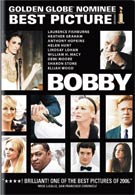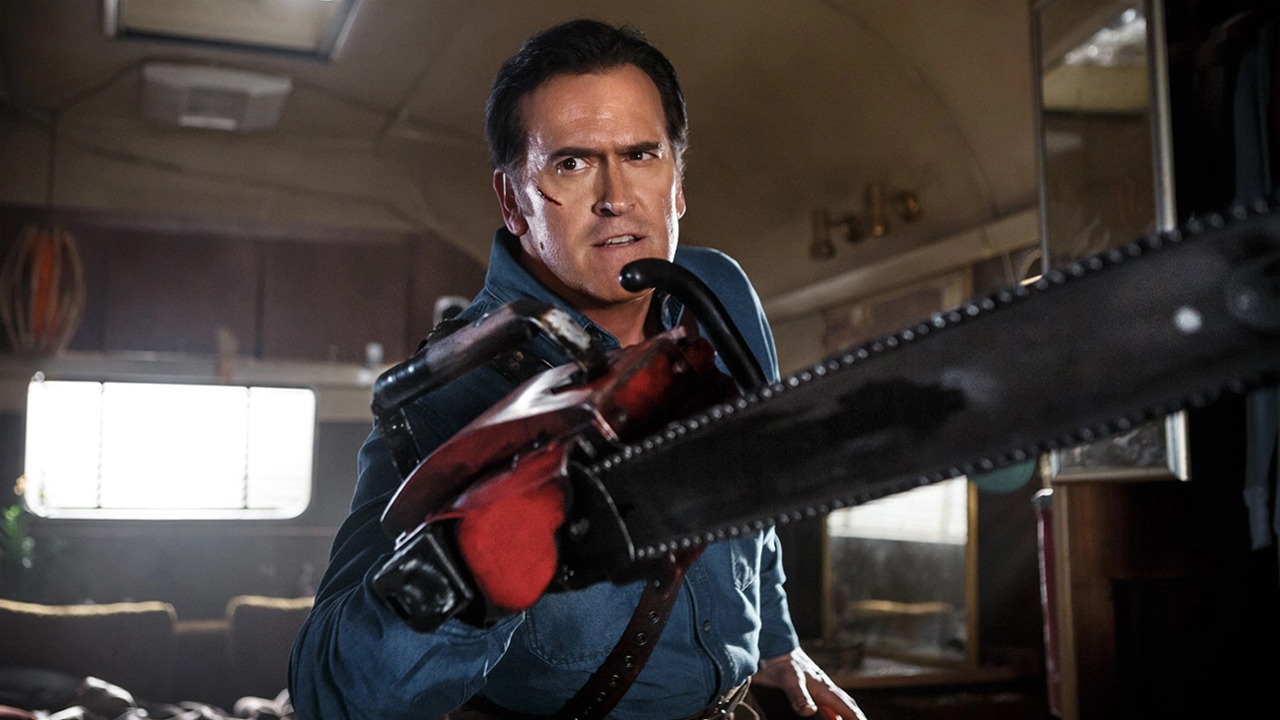I hate to admit it, but as a product of the public school system I know very little about Robert “Bobby” Kennedy. In my history lessons, the death of John F. Kennedy was always deeply mourned, with a look at what things might have been like had the President not been assassinated. Sadly, JFK isn’t the only Kennedy that thought process applies to. Bobby Kennedy never got a chance to start his presidential career, gunned down on a summer day in 1968 in the Ambassador Hotel, shortly after being named the winner of the California Democratic primary. Bobby shows the world that needed the presidential hopeful, through the eyes of a wide cultural cross section of that time. The most obvious thing to mention about Bobby is the smorgasbord of a cast. With a movie written and directed by Emilio Estevez and starring a lengthy list that includes Martin Sheen, Laurence Fishburne, Anthony Hopkins, Harry Belafonte, Helen Hunt, Joshua Jackson, and Elijah Wood, how can you not talk about the star power behind the film? Easy – everyone involved in the movie is perfect in this as an ensemble piece. The best praise I can offer is that nobody stands out above the rest of the cast or serves as a weak link (high praise considering Sharon Stone and Lindsay Lohan both have the potential to stink up the place). Estevez wisely divides the story time between 22 characters at the Ambassador Hotel, giving a clear picture of multiple cultures, from kitchen employees to traveling socialites, but not giving any of them more screen time than others.
Knowing that Bobby was about the day that Robert Kennedy was assassinated, I must admit I watched the movie with a perpetual feeling of waiting for the other shoe to drop. I knew that, in order to be successful, Estevez had to establish his characters so we would know the weight the death of the political figure carried in these people’s lives. When an hour passed and Kennedy hadn’t even shown up yet, I began to get worried. What exactly was Estevez trying to do here? By the hour and a half mark, when Kennedy finally does show up, I had lost all track of time. The characters, their wants, needs, and desires, their perfections and imperfections had become overwhelming, engulfing me in their lives and setting the stage beautifully for the final act and Kennedy’s assassination.
See, Bobby isn’t about the assassination of Robert Kennedy. Estevez wisely leaves controversies and political messages to other directors. Instead, Bobby is a window into the abyss that was 1968. Through these 22 characters we learn exactly what the time held and why Robert Kennedy held so much hope for the country. We see fighting spouses, arguing business managers, drugged-out political volunteers, and the sanctity of marriage being put aside in favor of saving another soul from the death sentence of a Vietnam tour of duty. We see what the world held for men and women. We see the world through the eyes of blacks, whites, and latinos in the midst of a civil rights battle. We see the world as it was.
Above all of these troubles is an underlying belief that Kennedy has the power to make the world a better place. It’s rarely spoken however. Nick Cannon’s African American political volunteer states that Kennedy is the only man he trusts with Dr. Martin Luther King dead, but otherwise it’s an unspoken confidence in the future to come; that things will be better once Kennedy wins the election. Because the tragic event of Kennedy’s assassination is so late in the movie there is little time to consider the consequences of his death. Instead of contemplating what the world could have been like if Kennedy hadn’t been killed or mourning the loss of hope, the movie puts all its power in building that hope – showing you what people were setting their hopes on - and then leaving the audience devastated with the rest of the characters when that hope is killed.
Nietzsche said that when you stare into the void, the void stares back at you. That is ultimately true about Bobby. While Bobby is about the world of 1968, connections to today’s world and the lack of a near-mythical figure like Bobby can hardly be missed, whether they are intentional or not. The assassination of Bobby Kennedy might be something far too easily overlooked in today’s general knowledge of history, but it’s clear that those tragic events on June 6th, 1968 have repercussions that continue to echo through history today. Considering an underwhelming performance at box offices, I suppose we should count our lucky stars that Bobby is getting anything more than a bare-bones release on DVD. While the bonus material on the DVD appears equally underwhelming at first, after watching what is here it’s clear that the DVD gets just the right amount of attention.
First, it must be noted that the movie looks fabulous. Estevez portrays Bobby through old footage of Kennedy’s public appearances that looks grainy and aged. The rest of the film looks incredibly clear in contrast. This is one of those DVDs that will leave viewers wondering if there really is anything to be gained by the higher resolutions of HD and Blu-Ray because the picture already looks amazingly clear throughout the movie.
At first I was annoyed at the absence of a commentary track. I would think that would be the easiest and cheapest bonus feature to produce, yet there is nothing to accompany the film. After watching the movie I must say I’m grateful a commentary isn’t provided. The movie builds its character so strongly, watching a commentary would detract from the biggest strength the film has. There are no awesome special effects to keep your attention while the director talks about how they created it. This is pure character work and listening to Estevez prattle on about the movie while trying to watch that would be the equivalent to watching the news while talking on the phone to a telemarketer. I just don’t think a commentary could provide enough to make up for being a distraction from the movie itself.
Your Daily Blend of Entertainment News
That’s not to say Estevez doesn’t get a chance to talk about his movie. The half-hour featurette “Bobby: The Making of an American Epic” gives the writer/director a chance to talk about a project that really was a labor of love. Estevez was to young when Kennedy was assassinated to remember meeting him or his death, but he was obviously affected by those events on some level. He talks about his drive to tell these stories, images and personal narratives that served as the framework for his 22 fictional characters, and how fortunate he was to surround himself with incredible people. “These are the people who typically say ‘no,’” Estevez points out. The featurette also looks at the little bit of filming the cast and crew were able to do on the actual site of the Ambassador Hotel (which was slated for demolition just after Estevez’s five year search for funding got him enough money to start filming) and the through process of Mark Isham in developing the film’s score.
The other featurette, “Eyewitness Accounts from the Ambassador Hotel,” shows a panel discussion with five people who were at the Ambassador Hotel the night Kennedy was shot. Clearly this panel took place following a screening of the movie, as the participants make reference to the film. It’s a bit dry for its half-hour running time. While it is good to hear historical eyewitnesses talk about what actually went, I think Bobby actually does a better job of communicating the emotion and chaos of that night’s events.
Because Bobby wasn’t exactly a solid performer in theaters, I think it’s unlikely we’ll see a second release coming somewhere in the future. However, this is the type of movie that should be seen. It’s a surprisingly emotional story told through some excellent character work. Obviously the advertising didn’t get audiences to see Bobby in theaters. Hopefully word of mouth can help promote this excellent film on DVD.

